Save the Planet is my son’s favourite book about sustainability and we read it often. After we read it last week he declared that “we need to save the planet!”. When I asked him how we’d do that he said by picking up rubbish.
I used to think litter wasn’t a problem in Australia. I never noticed it and of course always put my own rubbish in a bin.
Then I had kids and my toddlers would point out or pick up every piece of shiny or colourful rubbish we came across and I started to realise litter was everywhere. Every street, park, beach, waterway and even people’s front verges have small pieces of litter on them (and sometimes big ones).
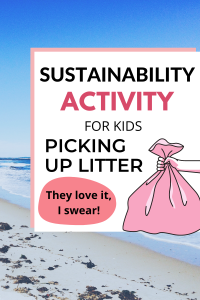
Where does it come from? I find it hard to believe that people just throw things on the ground. Even before I became eco-conscious it was drummed into me as a child not to litter. However a lot of large pieces of rubbish like bottles do appear to be carelessly discarded.
Most of what I seem to find are small pieces of rubbish. They may have blown away from someone’s picnic before they could catch it. Open and overfull bins tend to have their contents spread about by the breeze too. And then there’s wildlife moving litter about – hello bin chickens!
Honestly if you don’t know what I’m talking about, next time you go for a walk or take your kids to the park, keep your eyes on the ground and look out for rubbish. You’ll find so much! It’s often small pieces and can be a little hidden among the grass but there is plenty to find if you’re paying attention.
Why does it matter if there’s rubbish lying around?
Litter is detrimental to our natural environment. Not only that, rubbish is unsightly. We want to enjoy our beautiful public spaces not see them littered with rubbish.
Rubbish can be unsafe for humans. I get frustrated seeing broken glass on footpaths. It could easily flick up into someone’s sandals and cut their feet. And it is almost impossible to completely clean up without missing any small shards. Unhygienic items like used tissues and increasingly face masks can also harbour diseases.
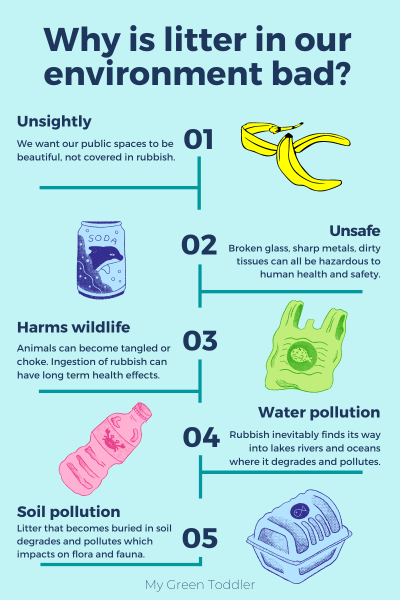
Littering can and does harm our wildlife. Animals can become tangled or trapped in waste items both on land and at sea. Animals can suffer long term health effects from ingesting plastic and other rubbish.
If rubbish is left lying around it eventually degrades and causes soil pollution. That’s if it hasn’t been blown into waterways and ends up in the ocean where it degrades and causes water pollution too.
Our latest rubbish clean up
Last week after visiting the zoo, my three year old spied a plastic bottle on the ground and suggested we pick it up. And so our clean up began. The bottle and a fast food paper bag were large, easy to find items but with just a little search we found a huge collection of rubbish.
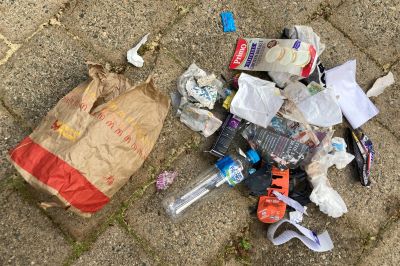
It was lucky that a bag was included in the litter so we had something to collect it all in. As this was an impromptu clean up, I hadn’t come prepared.
Tips for picking up litter with kids
Health and safety
- Supervise children appropriate to their age
This activity can be done with young children; I have collected rubbish with my two year old. However they must be past the age of putting things in their mouths for obvious reasons.
My children are fairly young so I try to get them to point things out to me before picking them up just in case there’s something unsafe.
- Consider protecting hands using gloves or tongs
I let my children pick up rubbish with their bare hands (and follow no. 3) but everyone has a different comfort level on this. If you’d prefer your kids hands to be protected, they could wear gardening gloves.
Another option is to pick up the litter with tongs. This is a fun novelty for the kids and also great for fine motor skills.
- Clean hands immediately afterwards
Soap and water is the best way to clean our hands so I prefer to do rubbish pick ups where I know there are bathrooms nearby. If hand washing is not available, sanitiser can be used instead but I still always wash the kids hands properly once we get home.
Make it fun
My kids actually like picking up rubbish, they don’t need too much extra incentive but I’m sure that won’t last forever. Here are a few ways to make it extra fun.
- Rubbish scavenger hunt
Turn the rubbish collection into a scavenger hunt. See how many things on the list they can find.
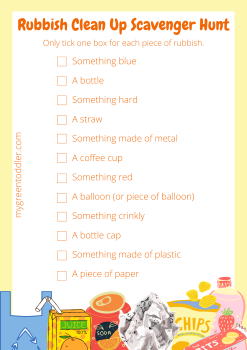
- Recycling activity
Even though it is tempting to dump everything in the bin, do the right thing and recycle as much as possible. Make it a challenge for the kids to learn what can be recycled.
- Take photos
Taking photos of the kids with everything they’ve collected helps them to feel proud of what they’ve achieved.
Do you pick up rubbish when you see it? What tips do you have for doing it safely and getting kids involved? Let me know in the comments.
More sustainability activities for kids
- 7 Meaningful Earth Day activities for kids
- How to make gardening exciting for kids
- 10 Picture books on sustainability for toddlers
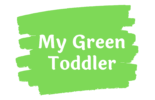
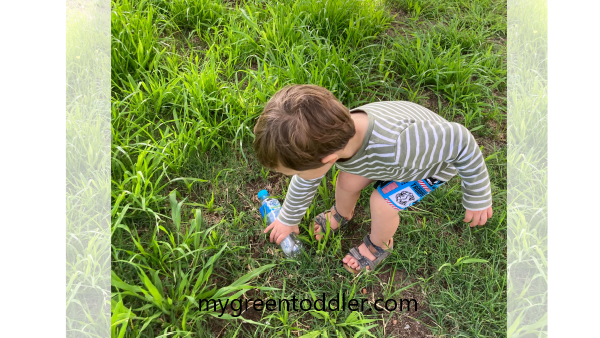
This is a great activity for kids to help the environment. And YES to gloves.
I love this for when my kids are older! My one year old still likes to try to eat everything haha
I love the idea of playing a cleanup scavenger hunt. So fun and also helping the environment. I remember last year we had a big storm and the amount of rubbish that got washed up on the beach was incredible. That’s when I became more active and careful about recycling.
This is such an easy and impactful activity for kids! We always gather up any litter we see when we go to our neighborhood playground.
This is a great activity for kids to learn and protect the mother nature. Global warming effects are real so it’s important that our children understand how their actions can help or hurt this earth we call home.
Great article, Carly – it is such a good idea to get kids on board with eco friendly activities at a young age! It becomes second nature to them as they grow up.
Pippa from http://www.eco-pippa.com